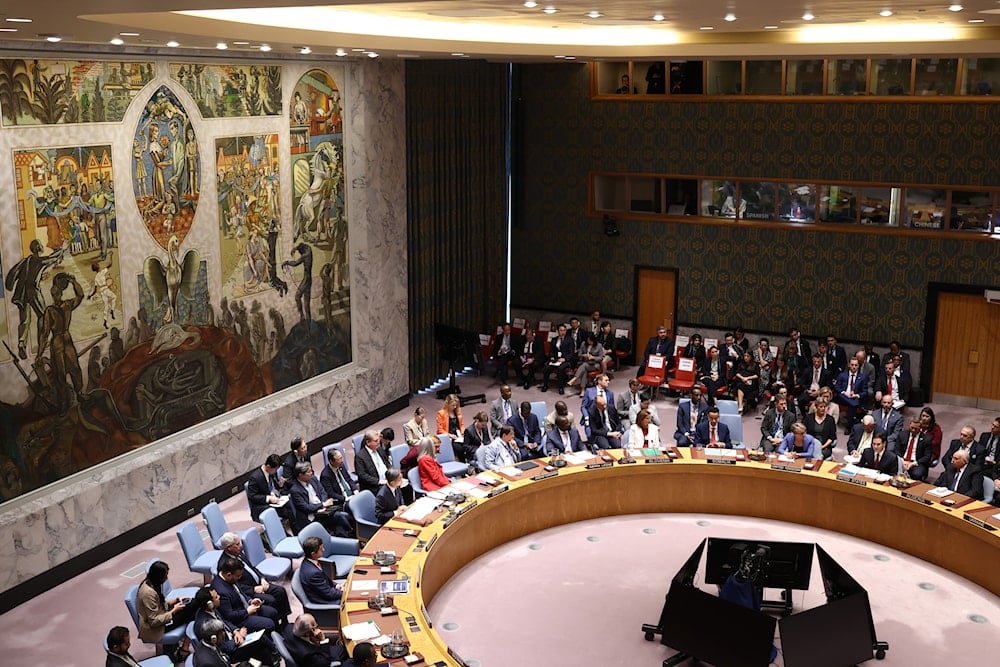Ansar Allah official slams UN sanctions, West's double standards
Mohammed al-Farah condemns the UN sanctions on Yemen, slams Western bias, and reaffirms Ansar Allah’s support for Gaza and resistance to US policies.
-

US Secretary of State Marco Rubio speaks during a United Nations Security Council ministerial meeting on Ukraine at the UN headquarters, Tuesday, Sept. 23, 2025 (AP)
Mohammed al-Farah, a member of the Political Bureau of Yemen’s Ansar Allah movement, commented on the recent UN Security Council decision to extend sanctions on Yemen, stating that Yemen would respond in kind to anyone who attacks its people’s interests or attempts to undermine its sovereignty.
He emphasized, in this context, that Yemenis will not hesitate to defend their rights, religion, and national dignity by all legitimate means.
In a post on X, al-Farah accused the Security Council of perpetuating “the worst example of double standards,” noting that it has long turned a blind eye to crimes of genocide in Gaza, even supporting "Israel" while ignoring the bloodshed, and covering up the blockade and aggression against Yemen without any moral or legal stance.
He continued, saying the council “continues to apply double standards while Gaza is being devastated under two years of bombing and blockade with US and Western weapons," reminding how "Yemen has been under siege for a decade.”
Al-Farah described the council as a platform for advancing Western interests, where “human rights are defined only as Western human rights and international interests are reduced to those of Washington alone.”
NGOs; culprits in espionage operations in Yemen
The Ansar Allah official also warned that some NGOs operating in Yemen have engaged in “dangerous practices”, including espionage on behalf of "Israel" under the guise of humanitarian work, exposing what he called the extent of "Zionist exploitation of UN institutions."
Al-Farah, however, praised Russia and China for refusing to renew sanctions on Yemen, contrasting their stance with what he described as the “moral failure” of the UN Security Council. He said Moscow and Beijing’s positions reflect a “humanitarian and ethical awakening” and awareness of the dangers of US policies that use sanctions to subjugate nations.
At the same time, he expressed hope that Russia and China’s position would amount to a definitive rejection and veto of the resolution, describing it as a stand that “rejects the exploitation of the Security Council and restores some balance against Western dominance.”
Sanctions on Yemen are merely tools for Israeli objectives
Al-Farah also criticized the West and the United States for openly supporting "Israel" with weapons and financial aid while shielding it politically, arguing that the proposed sanctions on Yemen are merely “tools to serve Zionist objectives and punish the Yemeni people for their resilience, independent decision-making, and solidarity with Gaza.”
He concluded by reaffirming Yemen’s steadfast support for Gaza and for oppressed communities across the region, pledging to continue opposing Western and US hegemony over the countries and peoples of the region without hesitation.
UNSC extends sanctions on Yemen
On November 14, the UN Security Council approved a resolution extending financial sanctions and a travel ban on Yemen for another year, until November 14, 2026, while also extending the mandate of the panel of experts supporting the sanctions committee until December 15, 2026.
The resolution, adopted by a 13-member majority with Russia and China abstaining, renews Yemen’s international sanctions under Resolution 2140 for an additional year. It maintains frozen assets and travel restrictions on designated individuals and entities and extends the mandate of the expert panel overseeing Yemen sanctions until mid-December 2026.
The Security Council imposes these sanctions on Yemen under US pressure and under the cover of Chapter VII of the UN Charter, through Resolutions 2140 (2014) and 2216 (2015).
The UN Security Council first imposed sanctions on Yemen in 2014 through Resolution 2140, targeting individuals and entities linked to destabilizing activities during the country’s ongoing conflict.
These measures included asset freezes and travel bans aimed at those accused of threatening Yemen’s stability or obstructing peace efforts.
In 2015, Resolution 2216 expanded the sanctions framework, further restricting financial and travel activities of key figures aligned with armed groups and reinforcing the Council’s oversight through a dedicated panel of experts.

 4 Min Read
4 Min Read









